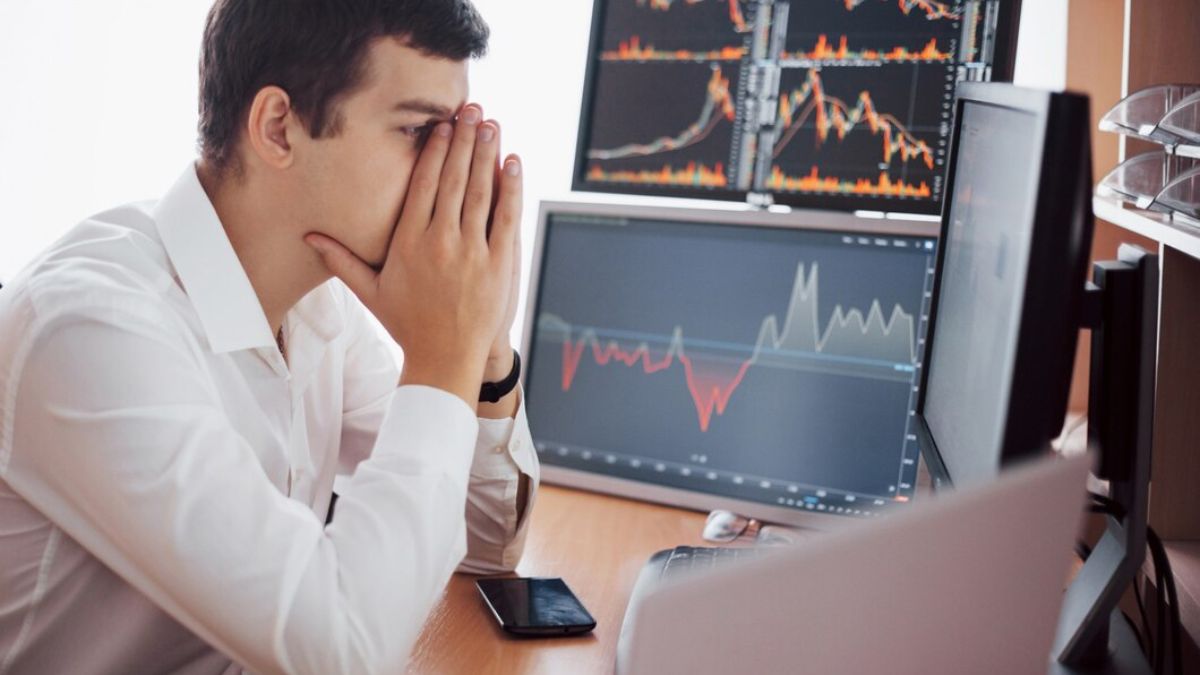TRADING
Emotional Management in Trading

Trading in financial markets is as much about mastering psychology as it is about mastering strategy. While many traders focus on analyzing charts, studying price trends, and developing robust strategies, successful trading often hinges on the ability to manage emotions effectively. Emotional management plays a critical role in making rational decisions, particularly in high-pressure environments where emotions such as fear and greed can cloud judgment.
This blog explores the importance of emotional management in trading and provides actionable strategies to strengthen your mental framework and improve your trading outcomes.
Why Emotional Management is Crucial in Trading
Trading often involves uncertainty and significant financial risk. Without emotional stability, even the most skilled traders can make poor decisions due to psychological biases.
Some of the key emotional challenges traders face include:
- Fear: Fear of loss, missing out (FOMO), or entering the market can lead to hesitation or rash decisions.
- Greed: Greed can push traders to take unnecessary risks or over-leverage their positions, hoping for higher returns.
- Overconfidence: A streak of wins may lead to overconfidence, resulting in lax risk management and over-exposure.
- Frustration: Experiencing losses may frustrate traders, driving them into revenge trading to recover their lost capital rapidly.
Mastering these emotions is vital for maintaining consistency and approaching the markets logically.
Benefits of Effective Emotional Management in Trading
Developing emotional control can lead to better long-term outcomes in trading. Key benefits include:
- Improved Decision-Making: Emotionally balanced traders are better equipped to assess market conditions and make rational decisions.
- Enhanced Risk Management: Controlling emotions like greed and fear ensures adherence to pre-defined trading plans and risk limits.
- Consistent Trading Performance: Emotional stability helps traders avoid impulsive decisions, leading to sustained performance.
- Reduced Stress: Emotional management reduces the mental strain of trading, improving overall well-being.
Common Emotional Triggers in Trading
1. Market Volatility
Sharp market swings can evoke fear or excitement, leading traders to deviate from their strategies.
Example: Sudden declines in a stock price may cause panic-selling, even if the long-term fundamentals remain strong.
2. Position Size
Placing overly large trades amplifies financial risk and pressures traders emotionally, making losses harder to manage mentally.
Tip: Adjust position sizes to align with your risk tolerance to lessen emotional strain.
3. Unrealistic Expectations
Expecting every trade to result in a profit can lead to frustration when outcomes don’t align with expectations.
Solution: Focus on the process of trading rather than perfection in results.
4. News and Rumors
Economic events, global news, or rumors in financial markets can trigger impulsive decision-making.
Advice: Avoid reacting emotionally to news without validating its impact on your trades.
Strategies for Emotional Management in Trading
1. Develop a Robust Trading Plan
A well-defined trading plan acts as a blueprint for trading decisions. It should include elements like:
- Entry and Exit Criteria: Define price levels or signals that guide when to enter or exit trades.
- Risk Management Rules: Set stop-loss levels and limits on how much capital you’re willing to risk on each trade.
- Profit Targets: Determine your profit goals in advance to avoid excessive greed.
Benefit: Having a plan in place reduces emotional decision-making by providing clear guidelines to follow.
2. Set Realistic Expectations
Understand that losses are inevitable in trading, no matter how skilled you are.
- Aim for consistent gains over time, instead of focusing on hitting home runs with every trade.
- Celebrate process adherence, such as sticking to your stop-loss rules, even if the trade doesn’t result in a profit.
Effect: Realistic expectations create a mindset where losses are viewed as part of the process rather than personal failures.
3. Use Automated Tools
Consider using automated trading tools to minimize emotional decision-making:
- Stop-Loss Orders: Automatically close a trade when the price hits a pre-set level.
- Take-Profit Orders: Lock in profits by exiting a trade upon hitting a predetermined target.
- Algorithmic Strategies: Some traders employ algorithms to automate entries and exits based on fixed criteria.
Advantage: Automation reduces the influence of emotions by executing trades according to predefined rules.
4. Practice Mindfulness and Stress Management
Trading can be intense— incorporating mindfulness techniques can help.
- Take Breaks: Step away from trading platforms to clear your mind, especially after a string of losses.
- Breathing Exercises: Practice deep breathing to calm the mind during market fluctuations.
- Regular Physical Activity: Exercise is a proven method to manage stress and improve focus.
Result: These practices help traders stay grounded and emotionally resilient in tumultuous markets.
5. Keep a Trading Journal
Maintaining a trading journal allows you to analyze your actions and emotional responses:
- Record the reasons behind your trades, including your mental state during the decision-making process.
- Identify patterns in behavior that hinder performance, such as revenge trading or abandoning your strategy.
Outcome: Journaling promotes self-awareness and continuous improvement by revealing areas for growth.
6. Educate Yourself Continuously
Staying informed about market trends, trading psychology, and strategies reduces uncertainty and instills confidence.
- Attend webinars, read books, or follow reputable trading educators.
- Learn more about emotional biases such as anchoring, loss aversion, and the disposition effect.
Bonus: An informed trader is more likely to remain steadfast and less prone to emotional swings.
Building Emotional Discipline Over Time
Mastering emotional management in trading requires consistent effort and practice:
- Start by identifying your emotional triggers through self-reflection and journaling.
- Gradually incorporate the strategies mentioned above until they become habitual.
- Surround yourself with a supportive community of traders who share similar goals.
Remember, trading is a skill that combines strategy and psychological resilience, and both take time to refine.
Take Control of Your Emotional State and Succeed
Managing emotions is a non-negotiable part of trading successfully. Whether you’re a novice or have years of experience, honing your emotional control will give you an edge in the market. By using tools, refining your trading plan, and focusing on self-improvement, you can make sound decisions even under pressure.
Want to elevate your trading skills further? Explore expert advice and resources on trading psychology today!

TRADING
How Much Does a Professional Trader Earn?

The world of trading is one that intrigues many due to its promise of financial independence and high earnings. But how much money does a professional trader actually make? Is it as glamorous and lucrative as some may think, or does it depend on various factors like experience, strategy, and market conditions? Let’s explore the earning potential of professional traders, the key factors impacting their income, and what it takes to succeed in this highly competitive industry.
Understanding the Role of a Professional Trader
Before we discuss earnings, it’s important to understand what a professional trader does. A professional trader buys and sells financial instruments such as stocks, bonds, currencies, or commodities, aiming to earn a profit from price fluctuations in the market.
Types of Professional Traders
- Institutional Traders
- Work for entities like banks, hedge funds, or investment firms.
- Often trade large volumes of assets on behalf of clients or the firm itself.
- Typically have access to advanced resources, tools, and training.
- Independent/Proprietary Traders
- Trade their own capital or company funds for personal profit.
- Operate in a more flexible environment but assume higher personal financial risks.
- Day Traders vs. Swing Traders
- Day traders engage in short-term trades, often completing all trades within a single day.
- Swing traders hold assets for longer periods, ranging from a few days to weeks, to capitalize on market trends.
Each type of trader has different earning potential based on their approach, market activity, and resources.
Factors That Impact Trader Earnings
While it’s possible to earn substantial money as a trader, income varies widely based on several factors.
1. Experience Level
- Entry-Level Traders
Beginner professional traders often earn a base salary of $50,000 to $70,000 per year in institutional settings. Independent traders may earn less initially due to higher risks and learning curves.
- Experienced Traders
With time, traders develop skills to identify market patterns and reduce risks. Experienced traders at financial institutions may earn $150,000+ annually, with bonuses significantly boosting income.
2. Trading Strategy and Style
- High-Frequency Trading (HFT) involves leveraging technology for rapid trades and often generates higher profits.
- Scalping focuses on small, frequent gains, while position trading may yield high, long-term returns.
- Strategy effectiveness depends heavily on market conditions and trader discipline.
3. Market Volatility
- High market volatility creates more opportunities for profit, as price swings tend to be larger.
- However, increased volatility also magnifies risk, so disciplined risk management is crucial.
4. Location and Firm Size
- Traders in global financial hubs (e.g., New York, London, or Hong Kong) tend to earn more due to access to larger markets and high-profile firms.
- Institutional traders at top investment firms typically have higher salaries and significant performance-based bonuses.
5. Bonuses and Commissions
- Institutional traders often receive bonuses based on individual or team performance, sometimes equating to several times their base salary.
- Independent traders rely entirely on profits from successful trades.
How Much Do Institutional Traders Make?
Institutional traders often enjoy a steady salary with additional performance incentives.
- Junior traders: $50,000–$100,000 base salary + performance bonus.
- Mid-level traders: $100,000–$250,000, often doubling with or exceeding bonuses.
- Top-tier traders: $500,000 and above in total compensation, especially if managing large portfolios.
Bonuses, calculated as a percentage of revenue generated for the firm, can substantially increase annual income for successful traders.
How Much Do Independent Traders Make?
Independent traders do not have a guaranteed salary since their earnings come solely from the profits of their trades.
- Early-stage independent traders: Often experience losses as they learn, with minimal profits during the initial months or years.
- Successful independent traders: Can earn anywhere from $50,000 to several hundred thousand dollars per year depending on expertise, risk tolerance, and capital.
- Top independent traders with consistent strategies and large starting capital may even surpass institutional trader earnings over time.
Notably, independent traders bear all financial risks, including potential losses, taxes, and trading fees.
Common Challenges Professional Traders Face
Despite the possibility of high income, trading is far from an easy career.
1. High Stress and Risk
The financial markets are unpredictable. Even seasoned traders face losses when markets behave unexpectedly.
2. Capital Requirements
Independent traders need initial capital to start trading. Accessing additional funds for trading can be challenging, especially after losses.
3. Constant Learning
Markets evolve, and traders must stay informed about economic trends, new technologies, and trading tools.
4. Regulatory and Tax Constraints
Professional traders must adhere to legal regulations in their country, and earnings are often subject to high taxes.
Tips to Succeed as a Professional Trader
Becoming a consistently profitable trader takes years of experience, dedication, and discipline.
- Start Small
- Focus on learning and refining strategies with small investments before scaling up.
- Invest in Education
- Take courses, attend seminars, and read trading books to build foundational knowledge.
- Practice With Simulators
- Use simulation tools to practice risk-free trading and develop confidence in strategies.
- Prioritize Risk Management
- Set loss limits and consistently use stop-loss orders.
- Build a Network
- Join trader communities or forums to share insights, tips, and experiences.
- Stay Patient and Disciplined
- Avoid emotional trading by sticking to your strategies and long-term goals.
Is a Career in Trading Worth It?
Trading can be a lucrative profession, but it’s not for everyone. The rewards are high, but so are the risks. For those with a passion for financial markets, discipline, and a willingness to learn, it offers the potential for significant financial and personal growth.
If you’re considering a trading career, start by developing a strong foundation of trading knowledge and take advantage of simulators or trial platforms to practice your strategies.
-

 EDUCATION11 months ago
EDUCATION11 months agoHighlights From the September 18 Board of Education Meeting
-

 PLATFORM10 months ago
PLATFORM10 months agoThe Ultimate Guide to MyDesi.Net – Where Culture Meets Connection
-

 BLOG10 months ago
BLOG10 months agoWho Is the Father of CSK? A Deep-Dive Into Chennai Super Kings’ Dominance in Cricket
-

 EDUCATION11 months ago
EDUCATION11 months agoA Look Back at the Board of Education City of Linden 2020 and Manganello’s Impact
-

 HOME IMPROVEMENT10 months ago
HOME IMPROVEMENT10 months agoHome Depot Tool Rental, Everything You Need to Know
-

 TECHNOLOGY11 months ago
TECHNOLOGY11 months agoUnderstanding Mega-Personal.Net Technology and Its Applications
-

 BLOG9 months ago
BLOG9 months agoUnderstanding Missav: Everything You Need to Know
-

 TRAVEL10 months ago
TRAVEL10 months agoTravel Smarter with TravelsForNow, Your Guide to Exploring the World